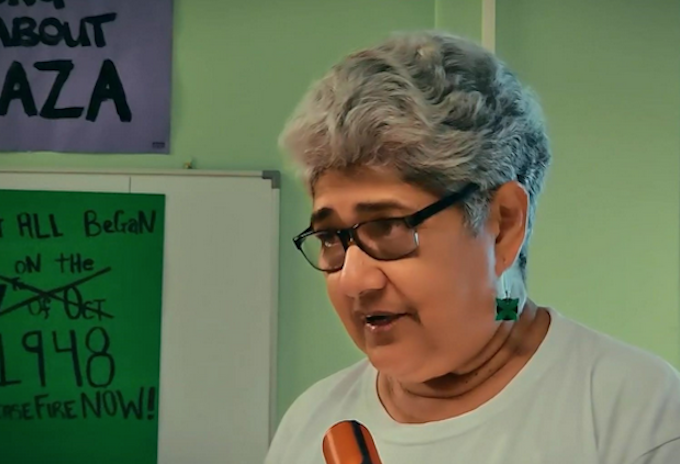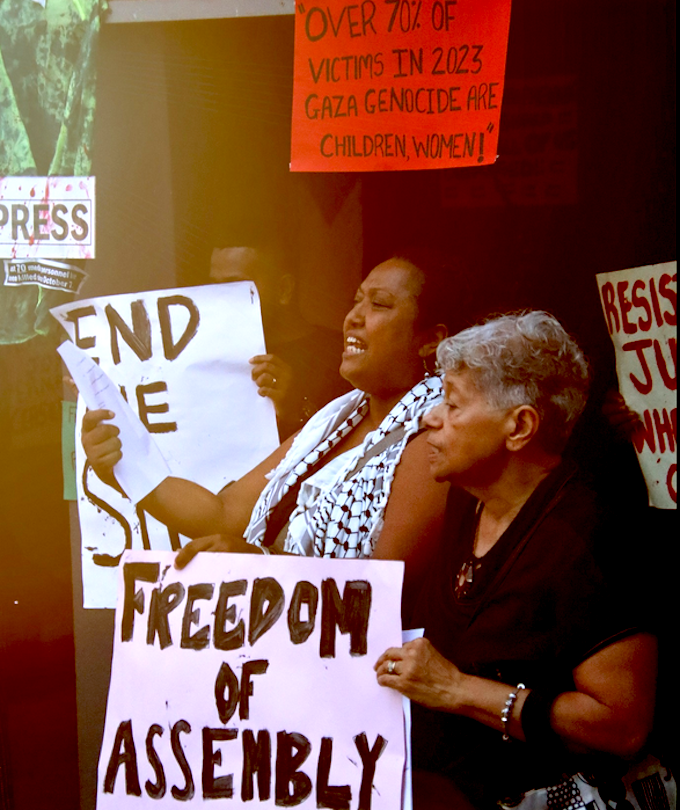
Fiji human rights activists have paid tribute in a Suva vigil this week to the more than 100 journalists — most of them Palestinian — killed in Israel’s War on Gaza.
The NGO Coalition on Human Rights (NGOCHR) staged a #ThursdaysInBlack vigil to remember the dead journalists, but only one local Fiji reporter turned up (from The Fiji Times).
The coalition had invited local journalists to attend and share their views. However, according to coalition chair Shamima Ali (of the Fiji Women’s Crisis Centre), Fiji media is reluctant to engage with the global crisis over the war.
- READ MORE: Journalists need to ‘take a stand’ over the Gaza carnage after latest killings
- Israeli military accused of targeting journalists and their families in Gaza
- South Africa’s genocide case against Israel over Gaza ‘chilling’ in detail
- 101 days of horror in Gaza – NZ is now a legitimate target for protest against Israeli war crimes
“Within the media outlets, we have Zionists themselves, so there is reluctance to report (on the Gaza conflict),” she said, reports Jake Wise of The Fiji Times.
In Australia and New Zealand, there is an ongoing controversy over some journalists and editors having been on junkets to Israel and then attempting to “silence” fair and balanced reporting on the war enabling a Palestinian voice.
South Africa has taken Israel before the world’s highest court, the International Court of Justice, alleging breaches of the Genocide Convention
One media outlet, Crikey, has been publishing a public list “outing” the names of journalists “influenced” by Israeli media or government management — more than 77 names so far. No similar list so far exists in New Zealand although there have been calls for one.
Part of the Fiji vigil featured Australian journalist Alex McKinnon, who shared insights into his life as a reporter covering the conflict and the censorship involved in silencing the Palestinian voice.
Heavy death toll
The coalition said more than 100 journalists, videographers and media workers had been killed in Gaza since the current war broke out last October 7, adding more journalists had been killed in three months of Israel’s War on Gaza than in all of World War Two (69) or the Vietnam War (63).
New investigations on U.S. and UK media bias have exposed chilling double standards by Western media when it comes to reporting on killings of Israelis compared to killings of Palestinians in Gaza. pic.twitter.com/uQ0I7cT340
— AJ+ (@ajplus) January 10, 2024
The high death toll in Gaza comes despite journalists being protected under international law — making attacks on them a war crime.
The New York-based Committee to Protect Journalists says that an unprecedented number of reporters were killed in the first 10 weeks of the genocide. It currently lists 82 confirmed killed, but it is verifying additional numbers.
Gaza’s media office has documented the killing of at least at least 110 media workers since the genocide started. Al Jazeera today reported 117 journalists killed.
Last May, the CPJ published “Deadly Pattern,” a report that found members of the Israel Defence Forces (IDF) had killed at least 20 journalists over the previous 22 years with impunity. Nobody had ever been charged or held accountable for their deaths.
The Israeli government has prevented independent entry to foreign journalists seeking to cover the genocide from within the Gaza Strip.
On December 22, the Paris-based Reporters Without Borders watchdog filed a second complaint with the International Criminal Court (ICC) alleging probable war crimes by Israel soldiers in the deaths of seven Palestinian reporters during the eight weeks ending December 15.
It has since been advised that the ICC would include the killings of journalists in its investigation of alleged war crimes by Israel.











































